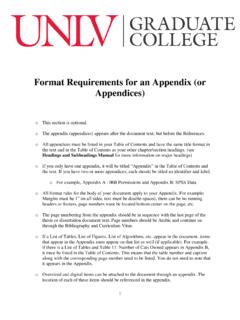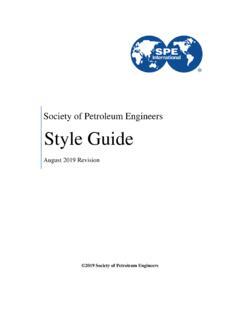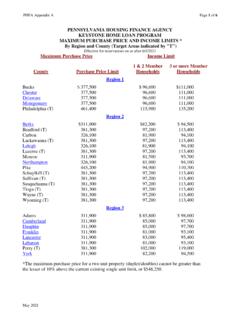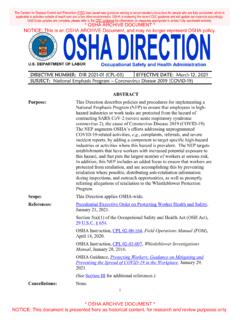Transcription of WHO | Validation without appendices
1 Working document May 2016 Draft document for comment 1 GUIDELINES ON Validation 2 (May 2016) 3 DRAFT FOR COMMENTS 4 5 World Health Organization 2016 6 All rights reserved. 7 This draft is intended for a restricted audience only, the individuals and organizations having 8 received this draft. The draft may not be reviewed, abstracted, quoted, reproduced, transmitted, 9 distributed, translated or adapted, in part or in whole, in any form or by any means outside these 10 individuals and organizations (including the organizations' concerned staff and member 11 organizations) without the permission of the World Health Organization. The draft should not be 12 displayed on any website. 13 Please send any request for permission to: 14 Dr Sabine Kopp, Group Lead, Medicines Quality Assurance, Technologies, Standards and Norms, 15 Regulation of Medicines and other Health Technologies, Department of Essential Medicines and 16 Health Products, World Health Organization, CH-1211 Geneva 27, Switzerland.
2 17 Fax: (41-22) 791 4730; email: 18 The designations employed and the presentation of the material in this draft do not imply the 19 expression of any opinion whatsoever on the part of the World Health Organization concerning the 20 legal status of any country, territory, city or area or of its authorities, or concerning the delimitation 21 of its frontiers or boundaries. Dotted lines on maps represent approximate border lines for which 22 there may not yet be full agreement. 23 The mention of specific companies or of certain manufacturers products does not imply that they 24 are endorsed or recommended by the World Health Organization in preference to others of a similar 25 nature that are not mentioned. Errors and omissions excepted, the names of proprietary products are 26 distinguished by initial capital letters. 27 All reasonable precautions have been taken by the World Health Organization to verify the 28 information contained in this draft.
3 However, the printed material is being distributed without 29 warranty of any kind, either expressed or implied. The responsibility for the interpretation and use 30 of the material lies with the reader. In no event shall the World Health Organization be liable for 31 damages arising from its use. 32 This draft does not necessarily represent the decisions or the stated policy of the World Health 33 Should you have any comments on the attached text, please send these to Dr S. Kopp, Group Lead, Medicines Quality Assurance, Technologies, Standards and Norms with a copy to Ms Marie Gaspard by 12 July 2016. Medicines Quality Assurance working documents will be sent out electronically only and will also be placed on the Medicines website for comment under Current projects . If you do not already receive our draft working documents please let us have your email address (to and we will add it to our electronic mailing list.)
4 2 Working document page 2 Organization. 34 SCHEDULE FOR THE PROPOSED ADOPTION PROCESS OF DOCUMENT 35 : 36 Guidelines on Validation 37 38 39 40 Discussion of proposed need for revision in view of the current trends in Validation during informal consultation on data management, bioequivalence, GMP and medicines inspection 29 June 1 July 2015 Preparation of draft proposal for revision of the main text and several appendices by specialists in collaboration with the Medicines Quality Assurance Group and Prequalification Team (PQT)-Inspections, based on the feedback received during the meeting and from PQT-Inspections, draft proposals developed on the various topics by specialists, as identified in the individual working documents. July 2015 April 2016 Presentation of the progress made to the fiftieth meeting of the WHO Expert Committee on Specifications for Pharmaceutical Preparations 12 16 October 2015 Discussion at the informal consultation on good practices for health products manufacture and inspection, Geneva, 4 6 April 2016 Preparation of revision by Dr van Zyl, a participant at the above-mentioned consultation, based on his initial proposal and the feedback received during and after the informal consultation by the meeting participants and members of PQT-Inspections.
5 May 2016 Circulation of revised working document for public consultation May 2016 Consolidation of comments received and review of feedback August September 2016 Presentation to the fifty-first meeting of the WHO Expert Committee on Specifications for Pharmaceutical Preparations 17 21 October 2016 Any other follow-up action as required .. 3 Working document page 3 Background information 41 42 43 The need for revision of the published Supplementary guidelines on good 44 manufacturing practices: Validation (WHO Technical Report Series, No. 45 937, 2006, Annex 4) (1) had been identified by the Prequalification of 46 Medicines Programme and a draft document was circulated for comment in 47 early 2013. The focus of the revision was the appendix on non-sterile 48 process Validation ( appendix 7), which had been revised and was adopted 49 by the Committee at its forty-ninth meeting in October 2014. 50 51 The main text included in this working document constitutes the 52 general principles of the new guidance on Validation .
6 53 54 The draft on the specific topics, the appendices to this main text, will 55 follow. 56 57 The following is an overview on the appendices that are intended to 58 complement the text in this working document: 59 60 appendix 1 61 Validation of heating, ventilation and air-conditioning systems 62 will be replaced by cross-reference to WHO Guidelines 63 on GMP for HVAC systems for considerations in 64 qualification of HVAC systems 65 (update - working document ) (2) 66 67 appendix 2 68 Validation of water systems for pharmaceutical use 69 will be replaced by cross-reference to WHO Guidelines on 70 water for pharmaceutical use for consideration in qualification of 71 water purification systems (3) 72 73 appendix 3 74 Cleaning Validation consensus to retain 75 76 appendix 4 77 Analytical method Validation update in process 78 79 4 Working document page 4 appendix 5 80 Validation of computerized systems update in process 81 82 appendix 6 83 Qualification of systems and equipment update in process 84 85 appendix 7 86 Non-sterile process Validation update already published as Annex 87 3, WHO Technical Report Series, No.
7 992, 2015 88 5 Working document page 5 Guidelines on Validation 89 90 91 1. Introduction 92 2. Scope 93 3. Glossary 94 4. Relationship between Validation and qualification 95 5. Validation 96 6. Documentation 97 7. Validation master plan 98 8. Qualification and Validation protocols 99 9. Qualification and Validation reports 100 10. Qualification 101 User requirement specifications 102 Factory acceptance test (FAT) and site acceptance test 103 (SAT) 104 Design qualification 105 Installation qualification 106 Operational qualification 107 Performance qualification 108 Requalification 109 Revalidation 110 Process Validation 111 11. Change management 112 12. Deviation management 113 13. Calibration and verification 114 References 115 116 117 118 1. INTRODUCTION 119 120 Validation is an essential part of good practices including good 121 manufacturing practices (GMP) (4) and good clinical practices (GCP). It is 122 therefore an element of the pharmaceutical quality system.
8 Validation , as a 123 concept, incorporates qualification and should be applied over the life 124 cycle of, the applicable product, process, system, equipment or utility. 125 126 These guidelines cover the general principles of Validation and 127 qualification. In addition to the main part, appendices on Validation and 128 qualification ( cleaning, computer and computerized systems, 129 6 Working document page 6 equipment, utilities and systems, and analytical methods) are included. 130 131 The following principles apply: 132 133 the execution of Validation should be in compliance with 134 regulatory expectations; 135 quality, safety and efficacy must be designed and built into the 136 product; 137 quality cannot be inspected or tested into the product; 138 quality risk management principles should be applied in 139 determining the need, scope and extent of Validation ; 140 ongoing review should take place to ensure that the validated state 141 is maintained and opportunities for continuing improvement are 142 identified.
9 143 144 The implementation of Validation work requires considerable 145 resources such as: 146 147 time: generally Validation work is subject to rigorous time 148 schedules; 149 financial: Validation often requires the time of specialized 150 personnel and expensive technology. 151 human: Validation requires the collaboration of experts from 152 various disciplines ( a multidisciplinary team, comprising 153 quality assurance, engineering, information technology, 154 manufacturing and other disciplines, as appropriate.). 155 156 2. SCOPE 157 158 These guidelines focus mainly on the overall concept of Validation 159 and are not intended to be prescriptive in specific Validation requirements. 160 This document serves as general guidance only and the principles may be 161 considered useful in its application in the manufacture and control of 162 starting materials and finished pharmaceutical products (FPPs), as well as 163 other areas.
10 Validation of specific processes and systems, for example, in 164 sterile product manufacture, requires much more consideration and a 165 detailed approach that is beyond the scope of this document. 166 167 There are many factors affecting the different types of Validation 168 and it is, therefore, not intended to define and address all aspects related to 169 one particular type of Validation here. 170 7 Working document page 7 171 The general text in the main part of these guidelines may be 172 applicable to Validation and qualification of premises, equipment, utilities, 173 systems, processes and procedures. 174 175 3. GLOSSARY 176 177 The definitions given below apply to the terms used in these guidelines. 178 They may have different meanings in other contexts. 179 180 calibration. The set of operations that establish, under specified 181 conditions, the relationship between values indicated by an instrument or 182 system for measuring (for example, weight, temperature and pH), 183 recording, and controlling, or the values represented by a material 184 measure, and the corresponding known values of a reference standard.















